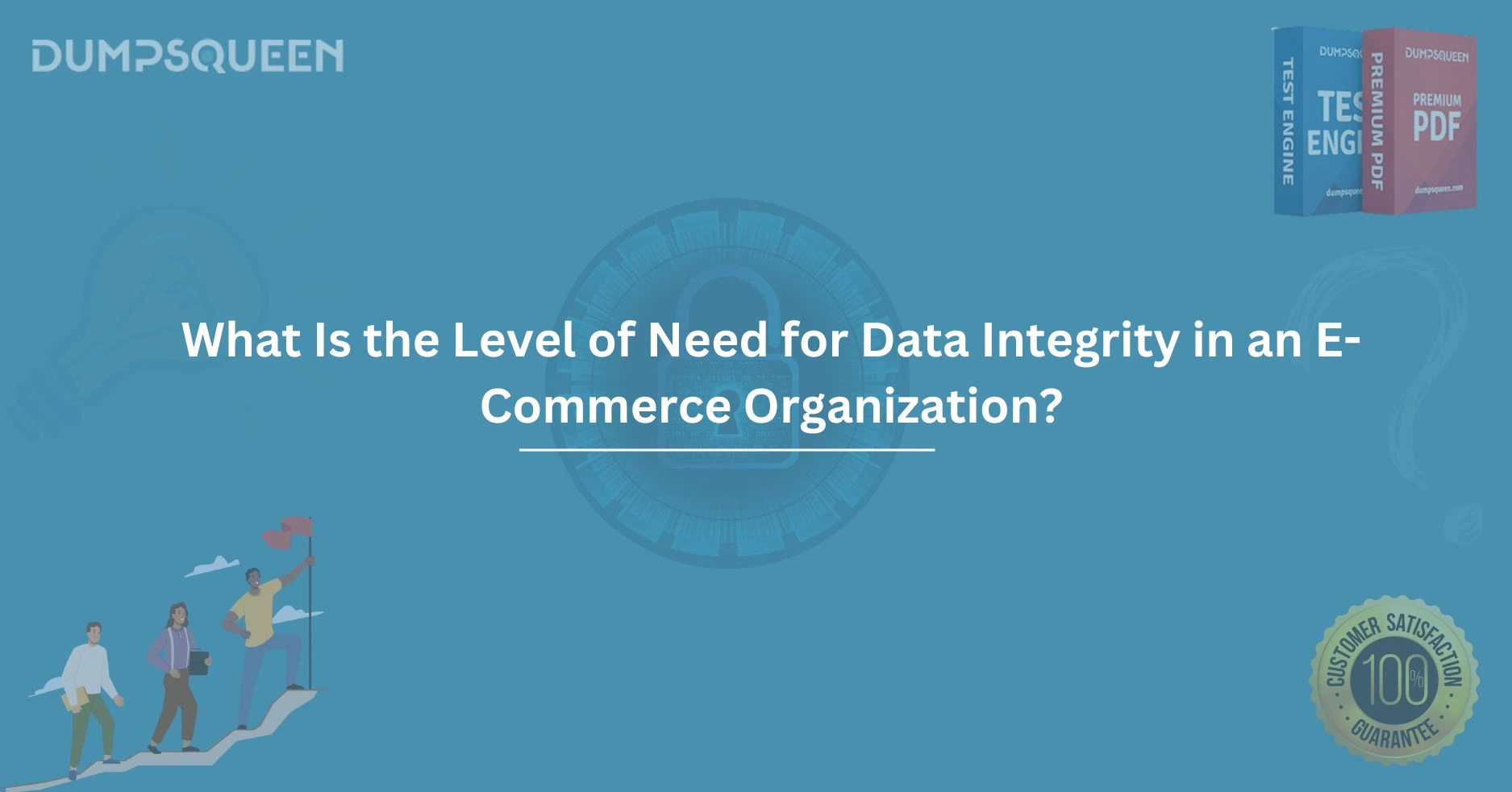Introduction
In the fast-paced world of e-commerce, where transactions occur at lightning speed and customer trust is paramount, data integrity stands as a cornerstone for success. For an e-commerce organization, maintaining accurate, consistent, and reliable data is not just a technical requirement but a strategic necessity. Whether it’s ensuring correct product listings, safeguarding customer information, or processing secure payments, data integrity influences every facet of the business. At DumpsQueen, we understand the critical role that data integrity plays in building a robust e-commerce ecosystem. This blog explores the profound need for data integrity in e-commerce organizations, delving into its importance, challenges, and strategies to uphold it, with insights tailored to empower businesses leveraging DumpsQueen’s expertise.
The Essence of Data Integrity in E-commerce
Data integrity refers to the accuracy, completeness, and reliability of data throughout its lifecycle. In an e-commerce organization, data flows through various touchpoints—product catalogs, customer profiles, payment gateways, inventory systems, and marketing analytics. Each of these relies on data that is free from errors, inconsistencies, or unauthorized alterations. Imagine a customer browsing an online store only to find incorrect pricing or unavailable products listed as in stock. Such discrepancies erode trust and can lead to lost sales. For businesses partnering with DumpsQueen, ensuring data integrity means delivering seamless experiences that align with customer expectations.
The stakes are high in e-commerce, where competition is fierce, and customers have endless options. A single error in data, such as a mislabeled product or a flawed payment process, can ripple across the organization, affecting reputation, revenue, and operational efficiency. Data integrity is not just about maintaining clean databases; it’s about fostering confidence among customers and stakeholders that the business operates with precision and reliability.
Why Data Integrity is Non-Negotiable
E-commerce organizations thrive on trust, and trust is built on accurate data. When a customer places an order, they expect the product description, price, and delivery timeline to match reality. Data integrity ensures that what is promised on the website is what is delivered to the doorstep. For instance, a customer purchasing a laptop from an e-commerce platform expects the specifications listed—such as processor speed or storage capacity—to be accurate. If the product delivered does not match the description due to a data error, the customer’s trust is broken, potentially leading to returns, negative reviews, or lost loyalty.
Beyond customer trust, data integrity is critical for compliance with regulations. E-commerce businesses handle sensitive information, including credit card details, addresses, and personal identifiers. Regulations like GDPR and PCI DSS mandate strict standards for data accuracy and security. A breach or error in data handling can result in hefty fines and legal repercussions. By prioritizing data integrity, businesses aligned with DumpsQueen can mitigate these risks, ensuring compliance while maintaining customer confidence.
Moreover, data integrity directly impacts operational efficiency. Accurate data enables smooth coordination between departments—marketing, sales, logistics, and customer service. For example, an accurate inventory database ensures that the warehouse team knows exactly what’s in stock, preventing overselling or stockouts. Inaccurate data, on the other hand, leads to costly mistakes, such as shipping delays or incorrect orders, which can tarnish a brand’s reputation.
The Consequences of Poor Data Integrity
The absence of robust data integrity measures can spell disaster for an e-commerce organization. Consider a scenario where a pricing error causes a high-value item to be listed at a fraction of its cost. Customers may rush to place orders, only for the business to cancel them later, citing an error. This not only frustrates customers but also risks negative publicity on social media and review platforms. Such incidents highlight how data errors can escalate into public relations crises.
Financial losses are another significant consequence. Incorrect data in payment processing systems can lead to failed transactions or overcharges, prompting chargebacks and disputes. These issues drain resources and erode profit margins. Additionally, inaccurate analytics data can mislead businesses into making poor strategic decisions, such as investing in unprofitable marketing campaigns or stocking unpopular products.
From a technical perspective, poor data integrity can destabilize systems. Corrupted or inconsistent data can cause website crashes, slow performance, or errors during checkout, all of which frustrate users and drive them to competitors. For organizations relying on DumpsQueen’s resources, avoiding these pitfalls starts with a commitment to rigorous data management practices that prioritize accuracy and consistency.
Challenges in Maintaining Data Integrity
Maintaining data integrity in an e-commerce environment is no small feat. One of the primary challenges is the sheer volume of data generated daily. From customer registrations to order updates and product reviews, e-commerce platforms process massive datasets that require constant monitoring and validation. Human errors, such as manual data entry mistakes, can introduce inaccuracies that propagate through the system.
Integration of multiple systems poses another hurdle. E-commerce businesses often use a mix of platforms—CRM software, payment gateways, inventory management tools, and third-party marketplaces. Ensuring that data remains consistent across these systems is complex, especially when updates occur in real time. A glitch in one system can cascade across others, leading to discrepancies.
Cybersecurity threats also undermine data integrity. Hackers may attempt to manipulate product listings, alter prices, or steal customer data, all of which compromise the reliability of the system. For instance, a malicious alteration to a product’s availability status could lead to overselling, damaging customer trust. Businesses leveraging DumpsQueen’s expertise can benefit from guidance on implementing robust security measures to counter these threats.
Finally, scalability presents a challenge. As an e-commerce business grows, so does its data footprint. Ensuring data integrity across an expanding operation requires sophisticated tools and processes, which can strain resources if not planned carefully.
Strategies to Uphold Data Integrity
To address these challenges, e-commerce organizations must adopt proactive strategies to safeguard data integrity. The first step is implementing automated validation tools. These tools can flag inconsistencies, such as duplicate entries or incorrect formats, before they cause problems. For example, a validation check could ensure that all product prices fall within an expected range, catching errors before they reach the customer-facing website.
Regular audits are another critical measure. By periodically reviewing databases, businesses can identify and correct inaccuracies, ensuring that data remains reliable over time. Audits should cover product information, customer records, and transaction logs to provide a comprehensive view of data health. DumpsQueen encourages businesses to integrate auditing into their routine operations to maintain high standards of accuracy.
Strong cybersecurity protocols are essential to protect data from external threats. Encryption, secure APIs, and multi-factor authentication can prevent unauthorized access and tampering. Additionally, businesses should train employees on best practices for data handling to minimize human errors. For instance, a warehouse worker updating inventory manually should follow strict guidelines to avoid mistakes that could disrupt the supply chain.
Investing in integrated platforms can streamline data flow across systems. A unified e-commerce solution that connects inventory, sales, and customer service reduces the risk of discrepancies caused by siloed systems. Cloud-based platforms, in particular, offer scalability and real-time synchronization, making them ideal for growing businesses.
Finally, fostering a culture of accountability ensures that everyone in the organization prioritizes data integrity. From developers to customer service representatives, all team members should understand the importance of accurate data and their role in maintaining it. By aligning with DumpsQueen’s commitment to excellence, businesses can cultivate this culture and achieve long-term success.
The Role of Technology in Ensuring Data Integrity
Technology plays a pivotal role in upholding data integrity. Advanced database management systems, for instance, offer features like referential integrity constraints, which ensure that relationships between data points remain consistent. For example, if a customer’s order is deleted, the system can automatically update related payment records to prevent orphaned entries.
Artificial intelligence and machine learning are also transforming how e-commerce businesses manage data. AI algorithms can detect anomalies, such as sudden spikes in product prices or unusual customer behavior, that may indicate errors or fraud. By integrating these technologies, businesses can proactively address issues before they escalate.
Blockchain technology, though still emerging in e-commerce, holds promise for enhancing data integrity. By creating immutable records of transactions, blockchain ensures that data cannot be altered retroactively, providing an additional layer of trust for customers and businesses alike. DumpsQueen recognizes the potential of these innovations and supports businesses in exploring their applications.
Building Customer Trust Through Data Integrity
At its core, data integrity is about delivering on promises. When customers shop on an e-commerce platform, they entrust the business with their money, time, and personal information. Accurate data ensures that their expectations are met, from correct product details to timely deliveries. A seamless shopping experience, free from errors or surprises, fosters loyalty and encourages repeat purchases.
Transparency is another way to build trust. If an error does occur—such as a pricing mistake—businesses should communicate openly with customers, offering apologies and remedies like discounts or refunds. By handling errors with integrity, businesses can turn potential setbacks into opportunities to strengthen customer relationships.
For organizations partnering with DumpsQueen, prioritizing data integrity is a pathway to differentiation. In a crowded market, businesses that consistently deliver accurate, reliable experiences stand out, earning the trust and loyalty of their customers.
Conclusion
In the dynamic world of e-commerce, data integrity is not a luxury—it’s a necessity. From building customer trust to ensuring compliance and driving operational efficiency, accurate and reliable data underpins every aspect of a successful online business. The challenges of maintaining data integrity, such as system integration and cybersecurity threats, are significant, but they can be overcome with the right strategies and technologies. By prioritizing data integrity, e-commerce organizations can deliver seamless experiences, avoid costly errors, and stand out in a competitive market. At DumpsQueen, we are committed to empowering businesses with the knowledge and tools to achieve excellence in data management. As you navigate the complexities of e-commerce, let data integrity be your foundation for success, ensuring that every transaction, every customer interaction, and every decision is built on a bedrock of trust and accuracy.
Free Sample Questions
- What is a primary benefit of maintaining data integrity in an e-commerce organization?
a) Increased website traffic
b) Enhanced customer trust and operational efficiency
c) Reduced need for marketing
d) Elimination of cybersecurity risks
Answer: b) Enhanced customer trust and operational efficiency - Which regulation emphasizes the importance of accurate customer data handling?
a) ISO 9001
b) GDPR
c) OSHA
d) FCC
Answer: b) GDPR - What is a common challenge to maintaining data integrity in e-commerce?
a) Limited product variety
b) Integration of multiple systems
c) Low customer demand
d) Excessive website bandwidth
Answer: b) Integration of multiple systems - How can AI contribute to data integrity in e-commerce?
a) By designing product packaging
b) By detecting anomalies and errors in data
c) By managing employee schedules
d) By creating social media content
Answer: b) By detecting anomalies and errors in data



